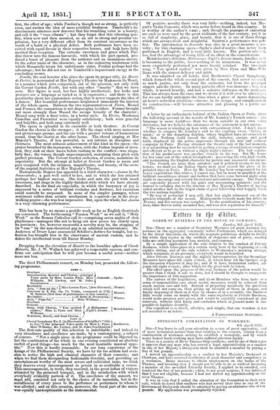PART t,
Overture Introduction, Quartet and Chorus-principal Voice parts by Miss Louisa Pyne, Miss '..Tessonda...Spohr.
Williams, Mr. Lockey, and M. Jules
Stockhausen Recitative
Aria, „ Non tni cur:, Miss Louisa Pyne, (Don (tioranni)..Mozart.
Concerto in E fiat, Op. 76, Violin, composed in 1782, / Mozart. M. Sainton (first time of performance in this country) . 1 Recitative. - — ....... (13 Ratio di Proserpma,)1 winter.
Aria, " Page fat," ....... t Miss Williams ... Overture Scherzo
Song, with Chorus, "You spotted A ifidsummer snakes," Miss L. Fyne and Miss Eight's Dream. .1 Mendelsr"°hm
Williams Notturno, March, and final Chorus
PART II.
Choral Symphony No. 9, (in Illustration of Schiller's "Ode to Joy,") the principal Voice parts by Miss L. Pyne, l Beethoven. Miss Williams, Mr. Lockey, and AI. Jules Stockhausen The first-rate quality of this selection is indubitable; and indeed its very abundance and excellence are made, by a contemporary, a subject of censure. "Not a single piece in the programme could be objected to, but the combination of the whole in one evening constituted an absolute surfeit of good things—too much for the most insatiable musical appe- tite." Now this is hardly reasonable. In our long experience of the doings of the Philharmonic Society, we have by far too seldom had OCCa- Bien to notice the high and classical character of their concerts; and when we find them disregarding fashionable frivolity, and providing an entertainment worthy of the most severe and cultivated taste, we think they deserve every encouragement to persist in so creditable a course. This encouragement,, in truth, they received, in the great influx of visitors attracted by the promised banquet, and in the satisfaction with which everybody eiridently partook of it. The excellence of the ooncert, we must add, consisted- not only in the choice of its materials.,. but in the suitableness of every piece to the performer or performers to whom it 'was allotted; and on this occasion, moreover, the vocal part of the nrasic was equally unexceptionable as the instrumental
Of positive novelty there was very little—nothing, indeed, but Mo- zart's Violin Concerto, which was never before heard in this country. It is worthy of the author's Lame ; and, though the passages of execution are such as were used by the great violinists of the last century, yet it is so full of simplicity, grace, and beauty, that it is one of those things which are always fresh and delightful. Sainton's performance was per- fect. The introduction to fessonda was also in a great measure a no- velty; for this charming opera—Spohr's chef-d'ceuvre—has never been performed in English, and is very little known. The portion, selected, too, had the advantage of losing little of its effect in the concert-room. Mendelssolin's delicious Midsummer Night's Dream music, familiar as it is becoming to the public, loses nothing of its attractions. It was never more exquisitely performed nor more keenly relished. The two-part song, "You spotted snakes," was given by Miss Pyne and Miss Wil- liams with the utmost delicacy and spirit.
It was admitted on all hands, that Beethoven's Choral Symphony, which formed the whole second part of the concert, had never received so much justice, not only from the orchestra, but from the principal singers and the chorus. In many parts its effect was immense ; but, as a whole, it moved heavily, and had a sedative influence on the audience. This has always been the case, and we doubt if it will ever be otherwise ; for we can hardly anticipate the time when a piece of music demanding an hour's unbroken attention—obscure in its design, and complicated in its construction—will become attractive and pleasing to a public as- sembly.


























 Previous page
Previous page